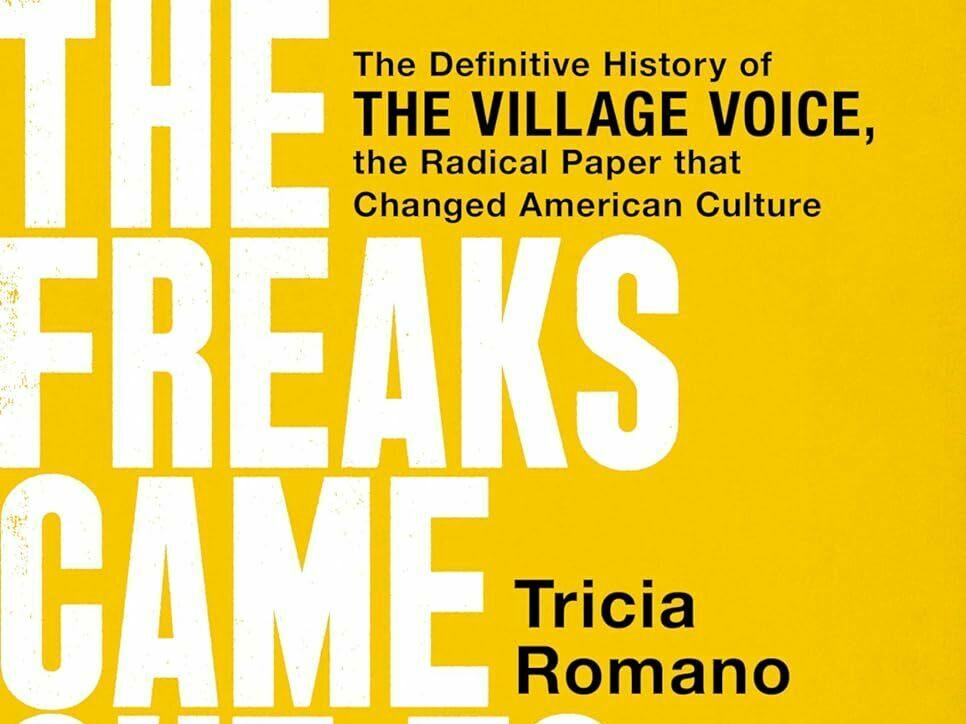Section Branding
Header Content
This oral history of the 'Village Voice' captures its creativity and rebelliousness
Primary Content
I met my husband while strategizing all night with a mutual friend over their lottery chance odds to get a book editor job at the Village Voice. Arguably every bit as life changing for me was the fact that after our friend somehow landed the job, they said, "Hey maybe you could write reviews for us?"
I was a graduate student in English, grinding out a theory-encrusted dissertation that even I didn't want to read. Those very first book reviews I did for the Voice made me feel as though I'd been roused from suspended animation and ushered into a world of light and color, where people mouthed off and enthused without first running their language through an academic deflavorizing machine.
During its golden age from the 1960s through the 1980s, people, especially young people, all over the country discovered in the Village Voice oppositional takes on Main Street USA. The Voice "was the go-to place to find out what was happening in music, film, local politics, national politics, books, [and] ... the art world," as summed up by Jim Fouratt, a gay-rights activist and co-founder of the Youth International Party — the Yippies. He's also one of the approximately 200 former Village Voice writers, staffers and editors who Tricia Romano interviews for her great oral history of the Voice called The Freaks Came Out To Write.
Romano started at the Voice as an intern and wound up writing columns on New York nightlife. It would take someone with an ingrained stamina for noise and chaos to interview this vast crew of Voice writers, readers, editors, photographers and artists, and to pull from older interviews with those who are no longer with us.
Among the assemblage are Greg Tate, Michael Musto, Vivian Gornick, Stanley Crouch, Robert Christgau, Joe Conason, Ellen Willis, Jack Newfield, Colson Whitehead, Ann Powers, Michael Tomasky, Jules Feiffer, Pete Hamill, Andrew Sarris, Karen Durbin, Wayne Barrett, James Wolcott, Thulani Davis and Norman Mailer, who was one of the people who founded the Voice in 1955.
To her credit, Romano doesn't just circle round the luminaries. By chronologically organizing short interview quotes around social moments like the second women's movement and Stonewall, she keeps her narrative moving while sporadically highlighting crucial, but lesser-known figures.
One of those people is Mary Perot Nichols, a reporter and editor who started in 1958. Nichols took on the titanic New York City parks commissioner and urban planner Robert Moses. In a brief account here that packs the wallop of Watergate, Voice colleagues recall how the intrepid Nichols discovered Moses' files buried in a storage area under Central Park — files that enabled Robert Caro to write his own exposés, as well as The Power Broker, his monumental biography of Moses.
Romano intersperses such journalistic triumphs with harsher estimations of, for instance, the "boys club" culture that dominated the Voice for decades. Because of the expletives she uses, I can't fully quote feminist writer Laurie Stone's condemnation of the sexism of colleagues like Mailer and Nat Hentoff, but she winds up calling them: "The kind of people who should never have existed, but since they have existed, we can only celebrate their disappearance."
Anger and profanity suffused the Voice, while its legendary classifieds section worked in magical ways to change lives. In 1974 Max Weinberg answered a classified ad that read, in part: "Drummer (no jr. Ginger Bakers, must encompass R&B and jazz)." Some 50 years later, Weinberg is still the drummer for the Jersey rockers who placed that ad: Bruce Springsteen and the E Street Band.
The Freaks Came Out To Write captures the elements that made a great American newspaper and the forces that killed it: the internet, the loss of advertising revenue, corporate greed, a changed New York City. There's still a monthly online version of the Voice, but as Romano says in her "Afterword" "The Voice ... is missing its mirror, New York, in its role as the center of the political and cultural universe. The internet has dispersed the culture."
The Voice was the living center of the marginal, the weird, the rebellious. In the space and time of reading this wild ride of a book, I returned to that creative, crazy margin, and I think many other readers will, too.


